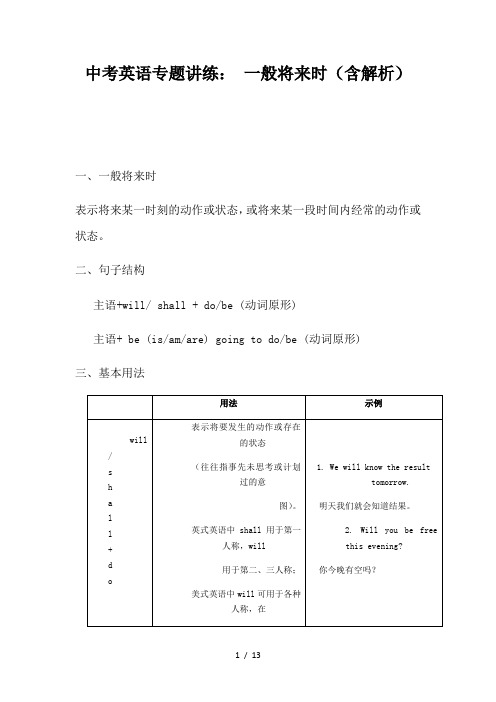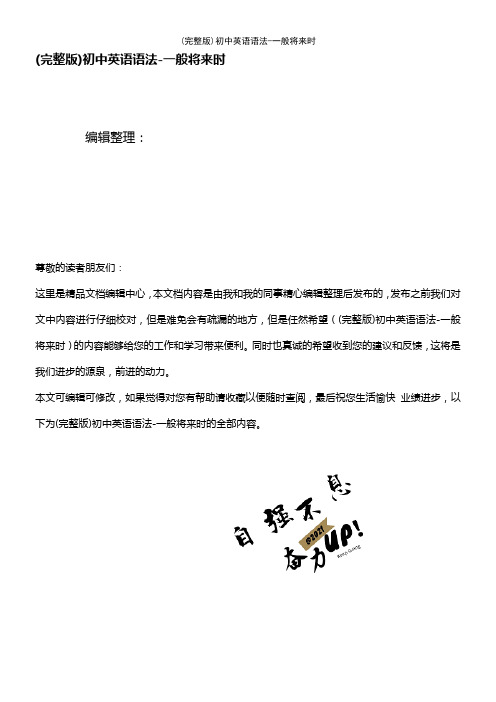初中英语语法-一般将来时经典版(附)
初中英语语法-一般将来时练习题(含答案)

初中英语语法-一般将来时练习题(含答案)1.There will XXX.2.Charlie won't work here next month.3.He is very busy this week。
but he will be free next week.4.There will be a dolphin show in the XXX.5.Are you going to be free tomorrow。
No。
I will be free the day after tomorrow.6.Mother will give me a nice present on my next birthday.7.No。
please don't.8.I will get it for you at once。
1.明天下午将举行一次会议。
2.XXX下个月不会在这里工作。
3.他这周很忙,但下周会有空。
4.明天晚上动物园会有一场海豚表演。
5.你明天会有空吗?不,我后天会有空。
6.我的母亲会在我下一个生日给我一个好礼物。
7.不,请不要。
8.我会立刻拿给你。
9.XXX Saturday?10.If they show up。
we will hold a meeting.11.He will give her a beautiful hat on her next birthday.12.He will write to us as soon as he arrives there.13.He will come back in three days.14.If it doesn't rain tomorrow。
we'll go roller-skating.15.No。
they won't.16.Who will we go XXX?17.We will XXX.18.Tomorrow。
(word完整版)初一下英语一般将来时

第三讲:一般将来时段时间内经常的动作或状态。
一、定义:一般将来时表示将来某一时刻的动作或状态,或将来某1. 表示将来某一时刻的动作或状态:e.g. She will buy a new bike tomorrow. We will drive to thepark next week. I shall visit my gra ndpare nts this weekend. They are going to play computer games this evening. Iam going to have a big meal.2. 将来某一段时间内经常的动作或状态:e.g. He is gong to have a big house n ext year .She will have a daughter.The cat will have a master.The dog will have a house.二、常与一般将来时连用的词1.时间状语系列:next Tuesdayn ext weekn ext yearthe coming Sun daythis after noontomorrowtoni ghtin a few mi nutesin the futurein five years fromnow on 厂soon三、一般将来时的构成1. wil /shall的一般将来时构成:主语+ will/shall + 动词原形+其它I will/shall go to Beiji ng next week. 语是第一人称时——shall主语为任何人称时——will否定句的构成:主语+ will/shall not +动词原形+其它will not =won 'sha[not=shan '【活学活用】按照要求改写句子1、My teacher will teach us next term.(改为否定句)2、I shall not buy new clothes this month.(改为肯定句)3、She is playing computer games.( 改为将来时)4、We shan't take part in the football match.( 改为肯定句)5、I visit my grandparents every weekend.(( 改为将来时)2. be going to 的一般将来时构成:主语+ be goingto + 动词原形+ 其他She is goingto play basketballthis afternoon.主语是” I ”时am主语为单数时is主语为复数及you 时 -- are否定句的构成: 主语+ be not going to + 动词原形+ 其他She is not going to play basketball this afternoon.is not = isn 't am not = ' m not are not = aren 'twill 或shall 与be going to 区别:1. will 或shall 用法总结:1) 表示一个将来的动作或状态,“要…,会…”She will go to the park tomorrow.2) 表示不以人的意志为转移的自然发展的事。
初中英语语法一般将来时

初中英语语法一般将来时一是表示将来的决定、承诺、意愿或预测;二是表示将来的惯或经常性动作;三是表示将来的突发事件。
going to则强调现在已经有了计划、安排或打算,即已经准备好要做某事了。
例如:I will call you later.(我会给你打电话。
)表示决定或承诺。
He will be a great doctor one day.(他将来会成为一名伟大的医生。
)表示预测。
I will always love you.(我将永远爱你。
)表示意愿。
We will have a meeting every Monday.(我们每周一都会开会。
)表示惯或经常性动作。
I will help you if you need it.(如果你需要,我会帮助你。
)表示突发事件。
She is going to study abroad next year.(她明年要出国留学。
)表示已经有了计划或打算。
一般现在时表示将来通常用于表示时间表或日程安排。
The train leaves at 8 am tomorrow.明天早上8点火车离开。
The conference starts on Monday.会议从星期一开始。
I have a dentist appointment next week.我下周有牙医约会。
1.The train will leave at six tomorrow morning。
indicating a future event that has already been led.2.The use of the future tense can also be seen in time or nal clauses。
as in "I'll write to you as soon as I arrive there" and "If it doesn't rain tomorrow。
一般将来时的12种表现形式(附词典例句)

一般将来时的12种表现形式(附词典例句)以下例句均出自词典(有标注)1.will /shall do 其中shall多用于第1人称;will可用于第2/3/1人称2.be going to do 表示决定、打算、计划做某事3.be doing4.be to do 表示计划、安排、约定、意图、将要,应该接近于should, ought to等5.be about to do6.be on the point of doing7.be due to do sth预定/预期/预计做某事8.祈使句9.倒装句——全倒装(只用一般过去时、一般现在时)10.情态动词 + do11.主将从现12.一般现在时的形式——表达将来的含义以下具体分述。
一般将来时的表现形式:以下例句均出自词典或高考真题(有标注)1.will /shall do 其中shall多用于第1人称;will可用于第2/3/1人称表示将要发生的动作或存在的状态表示倾向、习惯、必然发生的事shall用于第2/3人称,表示意志/决心/规定/必然性A meeting will be held next Tuesday at 3p.m.下星期二下午3点将召开一个会议(朗文5p2895)What time will she arrive? 她什么时候到达?(朗文5p2895)Trish will keep asking silly questions.特里斯老是不停地问一些愚蠢的问题。
(表示习惯,同上)Oil will float on water. 油总是浮于水面。
(表示总是、必然,朗文5p2895)Accidents will happen. 意外总是难免的。
(表示总是、惯于,朗文5p2895)We shall be away next week. 我们下周要出去。
(朗文5p2307)I’ve never liked her and I never shall. 我从来都不喜欢她,以后也不会。
2024年中考英语语法复习—一般将来时课件

2)用在由when,if等引导的时间状语从句和 条件状语从句中,表示将来的动作。
If it doesn’t rain tomorrow,we will go hiking. 如果明天不下雨,我们将去远足。
★一般将来时经常会伴随一些时间状语,比较常见的有:
tomorrow
soon
next week下周
练习
1 . There ________ a sports meet next week if it
________.
A.is going to have; doesn’t rain
B.is going to be; doesn’t rain
C.is going to be; won’t rain D.is going to have; won’t rain
Will you go there? 你要去那儿吗?
“Shall I...?”“Shall we...?”常用来征求对方意见。“Will you...?”表示客气的邀请或请求。
Will you please open the window? 请你把窗打开,好吗?
3.否定句:在will/shall后加not,可缩写成 won’t/shan’t 陈述句:I will go there./I shall go there. 我要去那儿。
to +
+其他
not,即主语+be not going
I am not going to watch the video. 我不准备去看录像。
3)一般疑问句:将be
Is he going to see a doctor? 他准备去看医生吗?
4)含有be goi to+动词原形+其他
(完整版)初中英语语法一般将来时态

与一般将来时连用的时间状语
tomorrow 明天 the day after tomorrow 后天 soon 很快
this year 今年 next week 下周 in the future 将来
in three days 三天后
in ten minutes 在一般将来时 中用IN 表示在多久以后
What are they going to do this evening? They are going to watch TV.
What is the bear going to do tomorrow?
It is going to cook dinner.
What are they going to do ?
There will be only one country. 否定句:在will后面加not.
There won’t be only one country. 一般疑问句:把will提到there之前。
Will there be only one country? Yes, there will. / No, there won’t.
一般将来时的主要用法:
1、表示将来某一时刻的动作或状态: We will come to see you the day after tomorrow. There will be a wonderful show next week.
2、表示将来某一段时间内经常的动作或状态: The students will come and work in the lab once a
They will do heavy work.
They won`t do Will they do heavy work. heavy work?
中考英语专题讲练: 一般将来时(含解析)

6. in (the) future将来、未来
五、相关句式
will do
be going to do
肯定式
主语+ will do…
主语+ be going to do…
否定式
主语+ will + not + do…
主语+ be + not + going to do…
疑问式
Will +主语+do…?
中考英语专题讲练:一般将来时(含解析)
一、一般将来时
表示将来某一时刻的动作或状态,或将来某一段时间内经常的动作或状态。
二、句子结构
主语+will/ shall + do/be (动词原形)
主语+ be (is/am/are) going to do/be (动词原形)
三、基本用法
用法
示例
will/shall+do
例1.1.3If they come, we _________ a meeting.
A.will have
B.have
C.had
D.would have
题模二:句型转换
例1.2.1I’ll go and join them.(改为否定句)
____________________________________
例:The train leaves at six tomorrow morning.火车明天上午六点开。
When does the bus star? It stars in ten minutes.汽车什么时候开?十分钟后。
2). if引导的条件状语从句,主句用一般将来时,从句用一般现在时表将来。
一般将来时(8张PPT)初中英语专项复习课件

肯定句:主语+ will +do+其他 People will have robots in their homes. 否定句:主语+ will not /won't+do+其他 People will not/won’t have robots in their 一般疑问句:Will+主语+do+其他? 肯定回答:Yes, they will. 否定回答:No, they won’t. Will people have robots in their homes?
homes.
2.而be going to +do通常用来谈论在一个较近的未来将要发生的计 划中的或是有可能发生的事。如:
I am going to visit us next month.(在一个较近的未来将要发生 的计划中的事)
It is so cloudy. I think it’s going to rain. (有可能发生的事)
一般将来时
初中英语专项复习
一、一般将来时的意义: 用来描述一个即将要发生的动作;谈论未来的计划和打算。
二、一般将来时的基本结构: will/shall+动词原形
be going to+动词原形
常见时间状语:
next Tuesday next week the coming Sunday next year this afternoon
tomorrow tonight in a few minutes in the future in five years
三、一般将来时
1.will 用于一切人称,shall只用于第一人称(I/we)。但现代英语倾向 于所有人称都使用will而不用shall。will/shall + do通常用来谈论未 来会发生的事或是正在制定的计划。 It will rain this afternoon.(未来发生) I will take an umbrella with me.(计划)
初中英语语法复习:一般将来时

初中英语语法复习:一般将来时一般将来时表示将来某一时刻的动作或状态,或将来某一段时间内经常的动作或状态。
常与一些表示将来的时间状语连用,如:tomorrow(明天),next week(下周),from now on(从现在开始);in the future(将来),in a few days等。
1、基本结构:be going to+动词原形 2. will+动词原形一般将来时:be going to+动词原形一般将来时:will+动词原形2. will 和be going to 的区别will 和be going to一般可以互用,但有时有区别:1)含时间和条件状语从句,如果主句是将来时,多用will.2)如果不是以人的意愿为转移,将来肯定会发生的动作和状态,多用will3)be going to根据迹象推测,有可能发生的事情或计划要做的事情。
3. there be 句型的一般将来式:1.There is/are going to be 2. There will be一、单项选择1.The old scientist ______ us a talk on future life next week.A.gives B.gave C.will give D.is giving2.—Jim, what are you going to do this weekend?—I ______ a movie with my dad.A.am watching B.watch C.watched D.am going to watch3.—Where’s mum?—She is trying on the new dress upstairs now. She _________ it to a party.A.wears B.wore C.will wear D.is wearing4.—What are you going to do next weekend?—There __________ a basketball match next Sunday. I want to watch it.A.will be B.will have C.is going to have D.are going to be 5.—Which team ________ the football match?—I’m not sure. The two teams both play well. Let’s wait and see.A.wins B.won C.is winning D.will win 6.Robots ________ us do some heavy and difficult jobs in the future.A.help B.helped C.are helping D.will help7.—What are you going to do next weekend, Wang Hui?—I ________ my grandparents next Sunday.A.visit B.visitedC.am visiting D.am going to visit8.I don’t know if it ________ sunny tomorrow. If it ________ sunny, I will go fishing. A.will be; is B.is; will beC.will be; is going to be D.is; is9.We are going to have a farewell party ________.A.now B.every day C.last week D.next Friday 10.There is going to ________ a basketball match tomorrow.A.be B.have C.is D.are11.Look at the dark clouds in the sky. It ________.A.is going to rain B.rained C.raining D.rainy 12.What ________you ________for tomorrow’s party?A.did; wear B.will; wear C.do; going to wear D.do; do13.He ________ busy this week. He ________ free next week.A.is; is B.will; will be C.is; will be14.There are many black clouds in the sky. It ________ soon.A.will rain B.rains C.rained D.is raining 15.It ________ warm in Dalian tomorrow.A.will be B.is C.does16.She will ________ a book about animals after school.A.buys B.buy C.is buy D.going to buy 17.Mike ________ his room yesterday, and he is going to ________ his homework tomorrow. A.cleaned; do B.cleaned; did C.clean; do18.—Our library is bright and beautiful.—Yes. Will you ________ us ________ it?A.shows; to B.show; aroundC.shows; around D.show; to19.Look! There are a lot of clouds in the sky. It is going to _______ soon.A.rains B.rainy C.be raining D.be rainy20.Li Ming ______ a T-shirt tomorrow.A.buys B.bought C.buy D.will buy 21.Sarah and I ______ a film next Sunday. We ______ horses last Sunday.A.am going to see; rode B.are going to see; rode C.will see; ride 22.—What are you going to do this weekend?—_______A.I’m going to visit my grandparents.B.I’m fine.C.I’m watching TV.D.I’m cleaning the room.23.—Peter! What is your plan for this Sunday?—I ________ my grandmother. She is in hospital.A.visit B.am visiting C.am going to visit 24.It’s cloudy all day today, but it ________ tomorrow.A.changes B.changed C.will change D.is changing 25.—Can your sister ________?—No, she can’t. But she ________ to swim next month.A.swims; is learning B.swim; is learningC.swims; is going to learn D.swim; is going to learn26.—When ________ you come back from London, Mary?—Last week. The River Thames is really beautiful and I ________ it again.A.do; visit B.did; visit C.do; am visiting D.did; will visit 27.This is our last night in China. We ________ home tomorrow.A.will fly B.fly C.flies D.flew 28.—Schools ________ different in the future.—Yes, you are right.A.is B.are C.were D.will be 29.—Why are you in a hurry, Cindy?—There ________ a basketball match between Class One and our class at 3 o’clock.A.are going to be B.will haveC.is going to have D.will be30.Tony _________ the Great Wall with his classmates next Sunday morning.A.visited B.visits C.will visit D.visit31.There ________ a sports meeting in our school next week.A.was B.were C.are D.is going to be 32.You can borrow this film—surely you _________ watching it.A.enjoy B.enjoyed C.will enjoy D.are enjoying 33.—Why are you in such a hurry, Peter?—I________ a basketball match between Class One and our class in ten minutes.A.join in B.am joining in C.joined in D.am going to join in 34.Robots and machines people do more work in the future.A.help B.will help C.are helping D.helped 35.After this exam, you ________ a wonderful holiday next month. Take it easy!A.have B.has C.had D.will have36.If it ______ rain tomorrow, my family ______ go for a walk in the park.A.isn’t, will B.doesn’t, willC.won’t, will D.won’t be, will37.—It’s hot here.—I ________ and open the window.A.go B.went C.am going D.will go 38.—When ________ Lingling ________ litter with her friend?—Next Saturday morning.A.does; collect B.did; collect C.will; collect D.is; collecting 39.Perhaps we ________ able to connect our minds to the Internet in the future.A.are B.were C.have been D.will be 40.—What’s your plan for the new term?—I ________ English well.A.learn B.learnedC.am learning D.am going to learn41.—Are you free? I’d like you to go to the museum with me.—Sorry, there _______ some important meetings this coming weekend.A.is going to have B.will have C.are going to be D.is going to be 42.There ________ schools in the future. Students will study at home.A.is going to have B.will be C.won’t have D.won’t be 43.—How will students learn then?—They ________ by computers in the classroom.A.studies B.studied C.will study D.is studying 44.—What are you going to do, Betty?—I’m going ________ football this afternoon.A.play B.to play C.played D.playing45.We hope ________ a computer on every student’s desk in the future.A.there is B.there wasC.there will have D.there will be46.—What are you going to do this Sunday?—I ________ a picnic with my parents.A.have B.had C.am having D.am going to have 47.We hope there ________ a war in the world. Everyone can live a happy life.A.will not have B.will be not C.is not going to be D.is not going to have 48.If you interview the estate agent, he ________ you much information about housing. A.gives B.gave C.will give D.is giving 49.—The radio says it ________ rain this afternoon, isn’t it?—No. I think it will be sunny.A.will go to B.is going to C.shall go to D.will be 50.Where __________ you __________ have a meeting tomorrow?A.do; go B.will; go C.are; go D.are; going to二、完成句子51.My mother will be back in an hour. (改为否定句)My mother back in an hour.52.The students will study at home in the future. (改为一般疑问句)the students at home in the future?53.Things will be different in the future. (变为一般疑问句)things in the future?54.There is a football match at the sports hall every day.(用tomorrow改写句子)a football match at the sports hall tomorrow.55.Alice is going to do her homework this afternoon. (改为—般疑问句)Alice her homework this afternoon?56.They are going to take a walk in the park. (就划线部分提问)they to in the park?57.They will meet at the school gate at 7 a.m. on Saturday. (对画线部分提问)they at the school gate?58.I’m going to learn English well because it’s very useful.(对划线部分提问)you going to learn English well?初中英语语法复习:一般将来时答案1.C【详解】句意:下周这位老科学家将给我们做一个关于未来生活的报告。
初中英语语法汇总(一般将来时)

初中英语语法汇总(一般将来时)初中英语语法汇总〔一般将来时〕一、一般将来时的定义一般将来时表示在如今看来即将要发生的动作或存在的状态。
常用时间副词tomorrow, soon或短语next year / week / month, in a few days, in the future, sometime 做状语。
二、一般将来时的基本用法及构成〔1〕一般将来时的基本用法是表示单纯的将来事实,由"will / shall + 动词原形'构成:〔shall只用于第一人称〕例句:We shall have a lot of rain next month. 下个月将下许多雨。
I think she will pass the exam. 我想他考试会及格的。
〔2〕"be going to+动词原形'用来表示事先考虑过的将要发生的动作以及已有迹象说明必将要发生的某事,意为"准备;就要'。
如:1. Were going to meet outside the school gate. 我们准备在校门口见面。
2. Look! Its going to rain. 瞧!快下雨了。
(3) 用"be to+动词原形'表示。
主要表示按打算或支配即将要发生的动作;有时也表示指令、禁止或可能性:He is to leave for Beijing tomorrow. 他确定明天去北京。
Tell him hes not to be back late. 告知他不准迟回。
(4) 用"be about to+动词原形'表示。
主要表示即将要发生的事:He is about to leave. 他即将要离开。
Sit down, everyone. The film is about to start. 大家坐好,电影马上就要开发始了。
注:该结构通常不与具体的时间状语连用:误:He is about to leave soon [tomorrow].另外,该结构在美国英语中还可表示"准备'(主要用于否认句):Im not about to lend him any more money. 我不准备再借给他任何钱。
初中英语语法-一般将来时经典版(附答案)

一般将来时一. 一般将来时的定义:表示将来某一个时间将要发生的动作或存在的状态,表示将来经常或重复发生的动作。
二.一般将来时的标志:tomorrow(明天),the day after tomorrow(后天)next year(明年)next month(下一个月)next week(下一个星期)三.一般将来时的构成:1.主语+be(am,is,are) going to+动词原形+......例如:(1).I am going to play football tomorrow.明天我将要踢足球.(2).She is going to watch a movie the day after tomorrow.后天她要看一场电影.2.主语+will/shall+动词原形+.....说明:(1).will/shall有时可以和be going to 互换;(2).will是万能的,shall只能用在第一人称,主语是I,we.(3).will和shall的后面接动词原形)例如:(1).I shall/will go to Beijing next month.(I will=I'll)下个月我将要去北京.(2).You will come to see me tomorrow.(you will=you'll)明天你将要来看我.(3).She will read English tomorrow morning.(She will=She'll)明天早上她将要读英语.四.句一般将来时的式:1.肯定句:(1)..主语+be(am,is,are) going to+动词原形+......(2)..主语+will/shall+动词原形+.....例句和上面一样,就不举了.2.否定句:(1)..主语+be(am,is,are) not going to+动词原形+......例如:(A): I am not going to play basketball tomorrow. 明天我不将踢足球.(B). She is not/isn't going to visit Shanghai next year. 明年她不将参观上海.(2)..主语+will/shall not+动词原形+.....(A). I shall not go to school the day after tomorrow。
一般将来时详解及练习

it'll,we'll,you'll,they'll。
'll,并与主语连写在一起,如:I'll,he'll,注:will 常简略为一、定义:表示将要发生的动作或存在的状态及打算、计划或准备做某事。
二、基本构成:①be going to +do.打算做某事一般将来时态:eg:I’m going to be a singer.我打算成为一名歌手。
She is going to learnEnglish.她打算去学习英语。
②will /shall +动词原形这种方法一般单纯地表示将来某个时间将要发生的动作或存在的状态。
will 用于各种人称;shall 只用于第一人称。
eg:I will /shall go to visit him next week.下周我将去拜访他。
What time shall we go there tomorrow?明天我们几点去那儿?③否定句:在be动词(am,is,are)后加not或情态动词will后加not构成won’t。
例如:I’m going to have a picnic this afternoon.→I’m not going to have a picnic this afternoon.④一般疑问句:be或will提到句首,some改为any,and改为or,第一二人称互换。
例如:We are going to go shopping this weekend.→Are you going to go shopping this weekend?⑤对划线部分提问:一般情况,一般将来时的对划线部分有三种情况。
1、问人。
Who例如:I’m going to New York soon.→Who’s going to New York soon?2、问干什么。
What…do例如:My father is going to watch football games with methis afternoon.→What is your father going to do with you this afternoon?3、问什么时候。
(2021年整理)初中英语语法-一般将来时

(完整版)初中英语语法-一般将来时编辑整理:尊敬的读者朋友们:这里是精品文档编辑中心,本文档内容是由我和我的同事精心编辑整理后发布的,发布之前我们对文中内容进行仔细校对,但是难免会有疏漏的地方,但是任然希望((完整版)初中英语语法-一般将来时)的内容能够给您的工作和学习带来便利。
同时也真诚的希望收到您的建议和反馈,这将是我们进步的源泉,前进的动力。
本文可编辑可修改,如果觉得对您有帮助请收藏以便随时查阅,最后祝您生活愉快业绩进步,以下为(完整版)初中英语语法-一般将来时的全部内容。
(完整版)初中英语语法-一般将来时编辑整理:张嬗雒老师尊敬的读者朋友们:这里是精品文档编辑中心,本文档内容是由我和我的同事精心编辑整理后发布到文库,发布之前我们对文中内容进行仔细校对,但是难免会有疏漏的地方,但是我们任然希望 (完整版)初中英语语法-一般将来时这篇文档能够给您的工作和学习带来便利。
同时我们也真诚的希望收到您的建议和反馈到下面的留言区,这将是我们进步的源泉,前进的动力.本文可编辑可修改,如果觉得对您有帮助请下载收藏以便随时查阅,最后祝您生活愉快业绩进步,以下为〈(完整版)初中英语语法—一般将来时> 这篇文档的全部内容。
一、用所给动词的一般将来时填空1. I ___________________(leave)in a minute.I ____________________(finish)all my work before I _______________ (leave)。
2。
-How long ________ you ________(study)in our country?—I ______________(plan)to be here for about one more year.—I ______________(hope)to visit the other parts of your country. —What ______ you ______(do)after you ____________(leave)here?—I ____________(return)home and ____________(get)a job.3. I ____________(be)tired。
中考语法复习 一般将来时(附中考真题及解析)

中考语法复习一般将来时(附中考真题及解析)一、一般将来时1.概念:一般将来时表示将来某一时刻的动作或状态,或将来某一段时间内经常的动作或状态。
2.一般将来时的三种意义:预测(prediction):表示说话人认为将会发生某件事,即是表示猜测将来某事发生的可能性如:It will rain later.一会会下雨。
事先计划(future plan):表示说话人在头脑里已经决定好将来要做某件事如:My holiday is so long , and I am going to travel.意愿(willingness):表示说话人既不是预计某事将会发生,也不是预计经过考虑决定将做某事,而是在说话的时刻立即表明他将去做某事如:Someone is knocking at the door, I will go and open it.二、一般将来时结构一般将来时常常和表示将来的时间状语连用。
英式英语第一人称用shall,第二、三人称用will,而美式英语则不管什么人称,一律用will。
如:tomorrow(明天),next week(下周),from now on(从现在开始);in the future(将来)等。
⒈主语+ be going to do 表示主观的打算或计划。
⒉主语+ shall/will + do sth 其否定式shall not 和will not 的缩写式分别为shan't 和won't。
⒊ be 主语+ to do 表示客观安排或受人指示做某事或已安排好要在将来发生的事,是比较正式的用法。
如:They are to go on a strike on July 8.She is to be married next month.You are to finish your homework before you go to play.⒋主语+ be about to do,意为马上作某事,不能与tomorrow,next week 等表示明确将来时的时间状语连用,意思为“正要,马上就要”。
一般将来时完整版本

他打算明天去打篮球。
一般将来时
He will play basketball tomorrow.
他明天将去打篮球。
.
请试着翻译:
We are going to play basketball this weekend. 我们这个周末要打篮球。
I am going to help you do that next day. 我明天帮你做那件事。
.
3. be going to 含有按计划准备做某事的意思,而 will 则 没有这个意思,如:
She is going to lend us her book. (她打算借我们书) He will be here in half an hour.(他半小时后就到)
4.在if引导的条件从句中,主语一般不用 be going to, 而 多用will, 如:
1.It _____(be) going to be my brother's birthday tomorrow.
2.My parents_____(be) going to buy me a new computer.
3.I think it will_____(rain) tomorrow. 4.He will _______(be) at school next Monday. 5.He is going to ______ (do) his homework after
.
用be going to 和will 填空
I am studying hard and I____ try for my English exa ms.
We____ die without air or water. Look at these clouds. It ____ rain. The new market _____be open on October 1.
- 1、下载文档前请自行甄别文档内容的完整性,平台不提供额外的编辑、内容补充、找答案等附加服务。
- 2、"仅部分预览"的文档,不可在线预览部分如存在完整性等问题,可反馈申请退款(可完整预览的文档不适用该条件!)。
- 3、如文档侵犯您的权益,请联系客服反馈,我们会尽快为您处理(人工客服工作时间:9:00-18:30)。
一般将来时一. 一般将来时的定义:表示将来某一个时间将要发生的动作或存在的状态,表示将来经常或重复发生的动作。
二.一般将来时的标志:tomorrow(明天),the day after tomorrow(后天)next year(明年)next month(下一个月)next week(下一个星期)三.一般将来时的构成:1.主语+be(am,is,are) going to+动词原形+......例如:(1).I am going to play football tomorrow.明天我将要踢足球.(2).She is going to watch a movie the day after tomorrow.后天她要看一场电影.2.主语+will/shall+动词原形+.....说明:(1).will/shall有时可以和be going to 互换;(2).will是万能的,shall只能用在第一人称,主语是I,we.(3).will和shall的后面接动词原形)例如:(1).I shall/will go to Beijing next month.(I will=I'll)下个月我将要去北京.(2).You will come to see me tomorrow.(you will=you'll)明天你将要来看我.(3).She will read English tomorrow morning.(She will=She'll)明天早上她将要读英语.四.句一般将来时的式:1.肯定句:(1)..主语+be(am,is,are) going to+动词原形+......(2)..主语+will/shall+动词原形+.....例句和上面一样,就不举了.2.否定句:(1)..主语+be(am,is,are) not going to+动词原形+......例如:(A): I am not going to play basketball tomorrow. 明天我不将踢足球.(B). She is not/isn't going to visit Shanghai next year. 明年她不将参观上海.(2)..主语+will/shall not+动词原形+.....(A). I shall not go to school the day after tomorrow。
后天我不将上学了(B). I will not write my homework this evening.(will notl=I won't)今晚我不将写作业(C). She will not see a movie next week.(will not=won't)下个星期她将不看一场电影.3.一般疑问句:(A).Am/Is,Are+主语+going to+动词原形+....例如(A). --Am I going to see my grandfather tomorrow?明天我将去看我的爷爷吗?--Yes,you are.是的,你将去.(B).-- Are you going to listening to the tape tomorrow?明天你将听录音带吗?---No,I am not.不,我不将.(C). --Is she going to Beijing next year? 明年我将去北京吗?--Yes,she is. 是的,她将.(2).Will//shall+主语+动词原形+...例如(A). --Shall we play volleyball next class? 下一节课我们将打排球吗?--Yes,you will. 是的,你们将.(B). --Will you come here next week? 下个星期你将来这儿吗?--Yes,I will. 是的,我将.(C).--Will she teach us this term? 这学期,她将教我们吗?--Yes,she will. 是的,她将.4.特殊疑问句:(1).What(Where,How...)+be(am,is,are)+主语+going to+动词原形+...?例如:(A).--What are you going to do tomorrow? 明天你将要做什么?--I'm going to the park? 我将要去动物园.(B).--Where are you going to swim? 你将要去哪儿游泳?--I'm going to swim in the river.(2). What(When,Where,How...)+主语+动词原形+...?例如:(A).---What will you do next week?下个星期你将要做什么?---I will do my homework。
我将要做作业.(B).--How will she come here tomorrow? 明天她将要怎么来这儿?--She will come here by bus。
她将要乘公共汽车来这儿.检测习题一、单选题:( ) 1. There __________ a meeting tomorrow afternoon.A. will be going toB. will going to beC. is going to beD. will go to be( ) 2. Charlie ________ here next month.A. isn’t workingB. doesn’t workingC. isn’t going to workingD. won’t work( ) 3. He ________ very busy this week, he ________ free next week.A. will be; isB. is; isC. will be; will beD. is; will be( ) 4. There ________ a dolphin show in the zoo tomorrow evening.A. wasB. is going to haveC. will haveD. is going to be( ) 5. –________ you ________ free tomorrow?– No. I ________ free the day after tomorrow.A. Are; going to; willB. Are; going to be; willC. Are; going to; will beD. Are; going to be; will be ( ) 6. Mother ________ me a nice present on my next birthday.A. will givesB. will giveC. givesD. give( ) 7. – Shall I buy a cup of tea for you?–________. (不,不要。
)A. No, you won’t.B. No, you aren’t.C. No, please don’t.D. No, please.( ) 8. – Where is the morning paper?– I ________ if for you at once.A. getB. am gettingC. to getD. will get( ) 9. ________ a concert next Saturday?A. There will beB. Will there beC. There can beD. There are( ) 10. If they come, we ________ a meeting.A. haveB. will haveC. hadD. would have( ) 11. He ________ her a beautiful hat on her next birthday.A. givesB. gaveC. will givingD. is going to giving( ) 12. He ________ to us as soon as he gets there.A. writesB. has writtenC. will writeD. wrote( ) 13. He ________ in three days.A. coming backB. came backC. will come backD. is going to coming back ( ) 14. If it ________ tomorrow, we’ll go roller-skating.A. isn’t rainB. won’t rainC. doesn’t rainD. doesn’t fine( ) 15. – Will his parents go to see the Terra Cotta Warriors tomorrow?–No, ________ (不去).A. they willn’t.B. they won’t.C. they aren’t.D. they don’t.( ) 16. Who ________ we ________ swimming with tomorrow afternoon?A. will; goB. do; goC. will; goingD. shall; go( ) 17. We ________ the work this way next time.A. doB. will doC. going to doD. will doing( ) 18. Tomorrow he ________ a kite in the open air first, and then ________ boating in the park.A. will fly; will goB. will fly; goesC. is going to fly; will goesD. flies; will go( ) 19. The day after tomorrow they ________ a volleyball match.A. will watchingB. watchesC. is watchingD. is going to watch( ) 20. There ________ a birthday party this Sunday.A. shall beB. will beC. shall going to beD. will going to be( ) 21. They ________ an English evening next Sunday.A. are havingB. are going to haveC. will havingD. is going to have( ) 22. ________ you ________ free next Sunday?A. Will; areB. Will; beC. Do; beD. Are; be( ) 23. He ________ there at ten tomorrow morning.A. willB. isC. will beD. be( ) 24. ________ your brother ________ a magazine from the library?A. Are; going to borrowB. Is; going to borrowC. Will; borrowsD. Are; going to borrows ( ) 25. – Shall I come again tomorrow afternoon?–________ (好的).A. Yes, pleaseB. Yes, you will.C. No, please.D. No, you won’t.( ) 26. It ________ the year of the horse next year.A. is going to beB. is going toC. will beD. will is( ) 27. ________ open the window?A. Will you pleaseB. Please will youC. You pleaseD. Do you( ) 28. – Le t’s go out to play football, shall we?– OK. I ________.A. will comingB. be going to comeC. comeD. am coming( ) 29. It ________ us a long time to learn English well.A. takesB. will takeC. spendsD. will spend( ) 30. The train ________ at 11.A. going to arriveB. will be arriveC. is going toD. is arriving二、动词填空。
